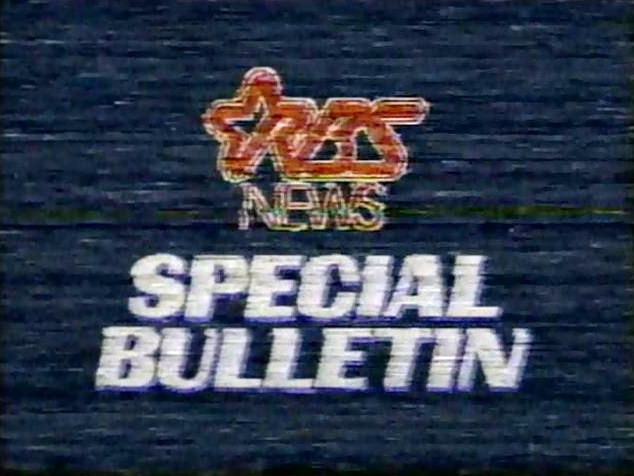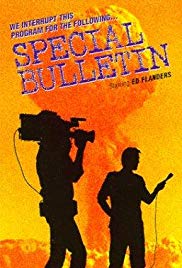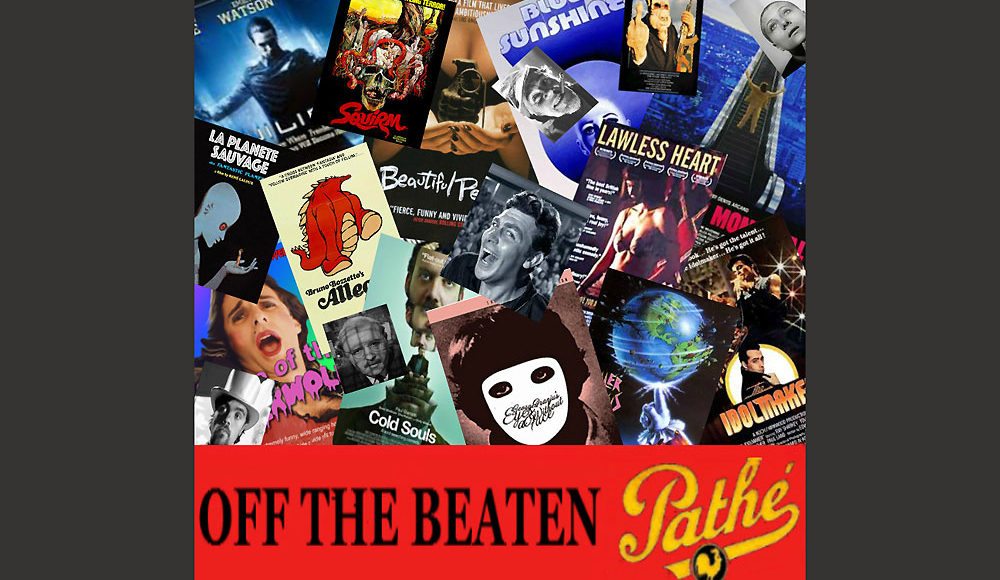By Ernest Kearney — It always pleases me when I revisit a film after many years and find that it’s as good as I remembered. Alas, that is often not the case.
But if anything, the 1983 made-for-TV thriller, Special Bulletin was better than memory held.
What may account for this is that the issues with which it deals — presidential duplicity, a loss of faith in established news outlets and domestic terrorism — are, sadly, more recognizable fixtures in our present-day world than they were in 1983; the year of the Jedi’s return, the McNugget’s debut and the Cabbage Patch riots.
The fictitious world in this Reagan era conceived movie is the stuff of headlines in the Trump era.
Today Producer/Director Edward Zwick is best known for the Civil War saga Glory (1989), Shakespeare in Love (1998) which won him an Oscar for producing, the Tom Cruise sword and kimono drama, The Last Samurai (2003) and the 2006 thriller Blood Diamond starring Leonardo DiCaprio and Djimon Hounsou.
Zwick started out working in television in the ‘70s; a period in his career that is noted for such critically praised series as Family (1978-1980) and thirtysomething (1987-1991). ** ![]() **
**
During that period, Zwick directed his first studio release About Last Night (1986), starring Rob Lowe and Demi Moore, with a screenplay by David Mamet developed from his play Sexual Perversity in Chicago.
But before all of that there was Special Bulletin, the last of three TV movies Zwick made within a two-year period and by far the most memorable of the trio.
First aired on NBC at 9:00 p.m. on March 20, 1983 the viewing audience who tuned in initially found a promo for a steamy late-night soap and heard a Television announcer’s voice:

“Next! Betrayal and remembrance in the continuing saga of love and life in ‘Morningside.‘ ”
It is possible that some viewers were reaching for their TV Guides to see if they had misread the listing for that hour – then the transmission is interrupted as an anchorwoman at a news desk appears:
“This is Susan Myles in New York. There is a rapidly unfolding situation in Charleston, South Carolina, this morning, where an unidentified group is holding four hostages on a ship. Apparently, they are demanding to make a statement, live, over the RBS network . . .”
In the format of a stream of “Special Bulletins” coming out of a network newsroom, (teleplay by Marshall Herskovitz, who coproduced with Zwick) unfolds the drama of a young TV reporter (Christopher Allport) and his cameraman who are covering a dock worker’s strike for a local Charleston news outlet when suddenly police converge on the wharf to investigate a stolen tugboat.
A shootout erupts between the police and those on by the network the tugboat and, in their effort to film it, both the reporter and his cameraman are taken hostage and forced onto the barge. There he is made to contact his station by the culprits who have taken them hostage and are demanding they be given a live network feed in order to make a broadcast.
Once on the air, the leader of the small band Dr. Bruce Lyman (David Clennon), a prominent figure in the anti-nuclear movement who was formerly “a strategic weapons planner for the Pentagon,” reveals that there is a small one megaton nuclear device of their own design on the tugboat.
He then delivers his ultimatum to the government that the 968 detonating modules be removed from every nuclear warhead in the Charleston area and navel yard and brought to him and his people within 36 hours. Once in their possession they plan to take the modules out to sea and destroy them.
“This is known as unilateral disarmament,” Lyman tells the viewers, “The first step on a long road. With Charleston disarmed, the Soviet Union can take steps to do likewise with their westernmost installations, and we believe that this action, as radical as it is, can set in motion, the most dramatic movement for peace in the last 30 years.”
If their demands are not met, they threaten to set off their device in Charleston Harbor.
The story of Special Bulletin continues to unfold as two news anchors of the fictitious television network RBS, co-anchors John Woodley (Ed Flanders) and Susan Myles (Kathryn Walker) cover the crisis live over the next 36 hours. They take reports from their reporters in the field, discuss events with an assortment of talking heads and interact with the terrorists as their deadline nears.
Special Bulletin draws from a variety of sources, Sidney Lumet’s 1964 nuclear thriller Fail Safe, and the news coverage of the events at the Three Mile Island Nuclear Generating Station near Harrisburg, Pennsylvania where for a week in 1979 Americans watched the government helmed by President Jimmy Carter deal with the most significant accident at a commercial nuclear plant in U.S. history.
But the main inspiration for Special Bulletin can be traced to the 1938 Halloween radio broadcast of H.G. Wells’ The War of the Worlds; as performed by the 23-year-old Orson Welles and his Mercury Theatre. Even the title harkens back to that infamous production when those who turned the dial to the playing of a big band orchestra suddenly heard:
“Ladies and gentlemen, we interrupt our program of dance and music to bring you a special bulletin from the intercontinental Radio News. At twenty minutes before eight, central time—“
The Martians had landed.
Special Bulletin played off fears of different alien invaders.
Under the presidency of Ronald Reagan, the Cold War rhetoric had been renewed with a vengeance and thoughts of mushroom clouds rising over the landscapes of “amber waves of grain” returned to plague a majority of Americans.
Three months before Special Bulletin aired, one of those Americans decided to take action.
On December 8, 1982 a white van with the message “#1 PRIORITY: BAN NUCLEAR WEAPONS” appearing on its side in oversized letters drove up to the base of the Washington Monument and stopped.
Norman David Mayer a 66-year-old World War II veteran leapt out, a drifter with a criminal record he was clad in a bright blue snowsuit and wore a black motorcycle helmet making him look like a bad first drawing of a Marvel Comic super villain.
He also appeared to be carrying some kind of a remote-control device.
 In an eerie foreshadowing of Zwick’s TV movie, Mayer demanded that a national debate on nuclear weapons commence or he would destroy the 555 foot tall Washington Monument with the 1,000 pounds of TNT he claimed to have packed inside the van.
In an eerie foreshadowing of Zwick’s TV movie, Mayer demanded that a national debate on nuclear weapons commence or he would destroy the 555 foot tall Washington Monument with the 1,000 pounds of TNT he claimed to have packed inside the van.
The next day as he jumped in his van and tried to drive off, the bullets of five police snipers surrounding the site fired. All hit their mark, killing him.
No explosives were found.
In Special Bulletin Zwick and Herskovitz capture the feel of actual news coverage.
There are segments on Charleston’s history, a psychoanalyst, Dr. Abraham Sczrsma (Kenneth Tigar) who evaluates the terrorists, updates from Washington, file coverage from Three Mile Island, interviews with survivors of the blasts at Nagasaki and Hiroshima (June Kyoto Lu and Robert Kay), there’s even footage from Mayer at the Washington Monument.
Special Bulletin draws from and even incorporates both historical and contemporary events, but it also takes on an issue just beginning to enter the national consciousness, that of the effects and participation of the media with those events it covers.
With the debate still on-going as to how much media coverage of Donald Trump contributed to his rise and the assault of the “Fake News” hordes against the “MSM” this is a topic that has greater resonance today than it did perhaps in 1983.
We see the effects, the evolution that occurs as the RBS network continues its coverage of events.
The “glitz” sets in. A dramatic music intro now ushers in each bulletin, the screen is crowded with graphics, cuts of Charleston and the siege at the wharf, inserts of the young reporter held hostage and those aboard the tugboat all under the red, white and blue banner: “Flashpoint: America Under Siege.”
This issue is even questioned by the “terrorists” over their media feed when one of their numbers, Dr. David McKeeson (David Rasche) takes them to task:
“I would like to make a statement. I just wanna say how much I love RBS News…. I love this logo with America Under Siege, with music in the background… and uh… it just gives me chills. Makes me real proud to be a part of this whole thing. It never ceases to amaze me the ability of the news media to trivialize any event of any significance… any meaning…. People are talking about us like we’re doing some sort of bad thing. A terrible thing. And we are making a statement. We’re trying to do a good thing just like John Woodley is trying to do a good thing, and I think we are together on this. Right—”
Then Woodley, one of the news anchors enters the debate—
John Woodley: Well, I think any connection between what Dr. McKeeson is doing and RBS in its attempts to cover it is highly remote.
Dr. David McKeeson: John, you eat us for breakfast and for lunch.
Shortly before its airing NBC suddenly began to pull back from the project.
NBC’s Reuven Frank, president of the News at the time, wrote of the decision, later, in his book “Out of Thin Air,” that he and Executive Vice President Tom Pettit reached:
“The only concern of NBC News was that Special Bulletin might have been confused with a news bulletin. We agreed on various steps to ensure that the average viewer will not be misled in that way.“
Part of those “various steps” was the placement of 31 disclaimers at each commercial breakaway and return and five inserted into scenes during the drama’s playing, which Zwick strongly and vocally objected to.
Special Bulletin would win the Emmy for Outstanding Drama Special.
Zwick would win honors with the Directors Guild of America for his work, as Herskovitz would from the Writers Guild of America for his teleplay.
When Zwick and Herskovitz won the Humanitas Prize for the project, Frank, a previous winner, was so outraged that he claimed he intended to return his Humanitas Prize but “I couldn’t find it.”
Howard Rosenberg in writing about the controversy over the TV movie for the Los Angeles Times opined:
“If NBC News President Reuven Frank and Executive Vice President Tom Pettit hate the show — and Pettit has been particularly vociferous on the subject within network ranks — it may be partly because network news has been aped so cleverly and accurately by a couple of guys from Hollywood, and also perhaps because the producers and their craftsmen came up with a better set for their anchors than NBC has been able to do over the years in umpty-ump expensive attempts.” ** ![]() **
**
Contributing to the success of Special Bulletin, as well as to the pleasure of viewing it now, is in watching the work of the fine cast Zwick assembled for the project, many of whom are no longer with us.
Christopher Allport was killed by an avalanche in California’s San Gabriel Mountains while skiing in 2008.
El Flanders passed away in 1995. He’s best remembered for playing the stoic Dr. Donald Westphall on the medical drama St. Elsewhere.
Rosalind Cash, who at the age of 56 also died in 1995, played Frieda Barton one of the terrorists. Her first film was the sci-fi The Omega Man when Charlton Heston personally selected her as his co-star.
Some we are lucky to still to have among us.
David Clennon and Kenneth Tigar were both featured in the political drama House of Cards
David Rasche has won fans as Jim Marwood on the comedy The Veep, and Michael Madsen who has a small part In Special Bulletin is still alive and wild.
And in closing one more kudo that Special Bulletin earned: In Leonard Maltin’s Movie and Video Guide, the critic who was notoriously harsh on Made-for-TV movies described Special Bulletin as “way above average.”
In a word, “Wow!”
♦ ♦ ♦
Here’s a linkto: “Special Bulletin”
** ![]() ** Zwick, unlike most who successfully segue into film careers from TV, would return to serve as executive producer on the short-lived My So-Called Life which showcased the talents of Claire Danes (Homeland) and Jared Leto (Academy Award for Dallas Buyers Club) and more recently Nashville (2016-2018).
** Zwick, unlike most who successfully segue into film careers from TV, would return to serve as executive producer on the short-lived My So-Called Life which showcased the talents of Claire Danes (Homeland) and Jared Leto (Academy Award for Dallas Buyers Club) and more recently Nashville (2016-2018).
** ![]() ** Howard Rosenberg, “NBC: A House Divided Over SPECIAL BULLETIN,” Los Angeles Times. (March 18, 1983, Friday)
** Howard Rosenberg, “NBC: A House Divided Over SPECIAL BULLETIN,” Los Angeles Times. (March 18, 1983, Friday)
We are The TVolution: a boutique Arts & Entertainment website, spreading the word about local events, creative projects and independently backed artistic offerings.
Like us on Facebook
Follow us on Twitter @theTVolution
Please Subscribe to our Newsletter
(Box on the Left Rail)
We Thank You for Supporting the Voices of TheTVolution
Looking for More Events? Click HERE






merriMac | May 19, 2021
|
I have an interesting addendum for your article. If you look up the film on Wikipedia, you will see that after the original broadcast, which had many disclaimers, Special Bulletin was rebroadcast in 1984, this time with a lot fewer disclaimers and then only on the commercial breaks and not during the film action. Well, many aware of this film might not realize this but there was at least a third broadcast years later on a cable network and this time there were no disclaimers and I believe it was heavily edited, most likely purposely to make it seem more real. I don’t remember if I stopped watching it or if the end was edited out or if maybe someone at the channel pulled the plug on it but I never saw the end showing Charleston’s devastation and the closing credits. I know this because I have since seen the whole movie. The last part I saw on air was Ed Flanders’ final on screen lines. I wish I could remember on which channel and exactly when the airing took place but it has been too long since and was so even by the time I finally discovered the name of the film more than a decade later. I remember where I was living so it would have been between 1989 and 1993. But at the time, I didn’t have a computer, the internet was still in its infancy, I didn’t have a cellphone and I didn’t even have a car. I was home alone flipping channels when I found it the first time well into the broadcast. I watched a few minutes until a commercial break and then flipped channels some more before coming back to it again. That first time, I wanted to find something different to watch…lest you think me cold, I’ve never been a big fan of broadcast news. But I came back to it again a little past half the film and this time it had my attention. It seemed so real. The cable channel even eliminated the commercial breaks during the most tense moments, especially about when the blast occurred. I did some more channel flipping during and after the broadcast just to try and get corroboration. I remember thinking that it seemed a little dated…clothing, hair, vehicles…but not enough to be convincing, not at the time. But shortly after the film, regular programming resumed on the channel and no other channels had any coverage at all. And the next day, there was nothing about it in the newspapers. So I knew it had to have been a movie. I just didn’t have proof until many years later, though I have yet to figure out which channel had aired it. But at the time, it was very shocking and provocative. I doubt anyone would be able to pull off something like this today. We’re too connected. But then I never would have thought something like the Orson Welles War of the Worlds radio broadcast could have happened again, let alone myself and so many others be taken in by it. But Special Bulletin did just that…in each of the airings I know of.